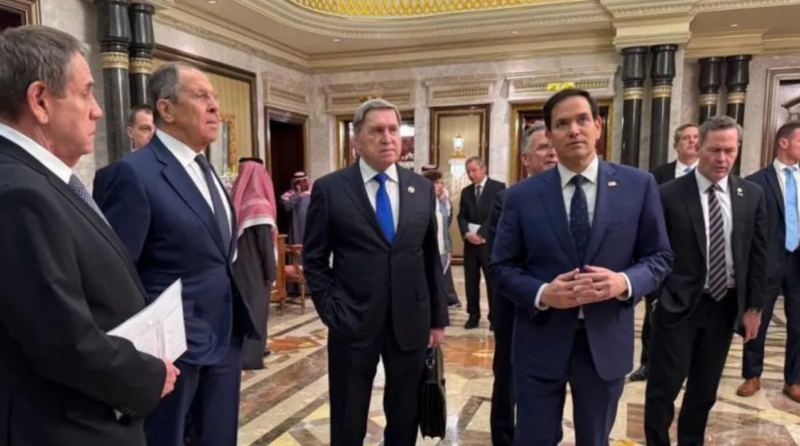Donald Trump has taken aim at Ukraine after its President, Volodymyr Zelensky, said it was a “surprise” his country had not been invited to talks in Saudi Arabia on ending the war with Russia.
Saying he was “disappointed” by Ukraine’s reaction, he appeared to blame Ukraine for starting the war, saying the country “could have made a deal”.
A full-scale Russian invasion sparked the war in Ukraine almost three years ago.
Earlier on Tuesday, Russian Foreign Minister Sergei Lavrov met US Secretary of State Marco Rubio in Riyadh for the first high-level, face-to-face talks between the two countries since the invasion.
They agreed to appoint teams to start negotiating the end of the war.
Lavrov said his country would not accept peacekeeping forces from Nato countries in Ukraine under any peace deal, a proposal raised at a meeting of European members of Nato in Paris on Monday.
European Nato states, who remain committed to supporting Ukraine against Russia, have been smarting at being sidelined by Trump’s unilateral peace initiative, which reversed the resolutely pro-Ukraine policy of his predecessor as president, Joe Biden.
Speaking to reporters at his Mar-a-Lago residence, Trump was asked by the BBC what his message was to Ukrainians who might feel betrayed.
“I hear that they’re upset about not having a seat, well, they’ve had a seat for three years and a long time before that. This could have been settled very easily,” he said.
“You should have never started it. You could have made a deal,” he later added.
“I could have made a deal for Ukraine,” he said. “That would have given them almost all of the land, everything, almost all of the land – and no people would have killed, and no city would have been demolished.”
After the meeting in Riyadh, Trump said he was “much more confident”.
“They were very good,” he said. “Russia wants to do something. They want to stop the savage barbarianism.”
“I think I have the power to end this war,” he added.
Asked about the prospect of European countries sending troops to Ukraine, Trump said: “If they want to do that, that’s great, I’m all for it. If they want to do that, I think that’d be fine. I mean, I know France has mentioned it, others have mentioned it, UK has mentioned it.”
However, he added: “We won’t have to put any over there because, you know, we’re very far away.”
After Monday’s meeting in Paris, British Prime Minister Sir Keir Starmer said any Ukraine peace deal would require a “US backstop” to deter Russia from attacking its neighbour again.
Sir Keir said a “US security guarantee was the only way to effectively deter Russia”, and vowed to discuss the “key elements” of a peace deal with Trump in Washington next week.

Also at the talks in Riyadh were US Middle East envoy Steve Witkoff and US National Security Advisor Mike Waltz, as well as Russian presidential aide Yury Ushakov and the head of Russia’s sovereign wealth fund, Kirill Dmitriev.
Stressing that Moscow would not agree to peacekeeping forces from Nato countries in Ukraine under any peace deal, Lavrov said: “Any appearance by armed forces under some other flag does not change anything. It is of course completely unacceptable.”
He said the US and Russia would appoint ambassadors to each other’s countries as soon as possible and create conditions to “restore co-operation in full”.
“It was a very useful conversation. We listened to each other, and we heard each other,” he said.
He reiterated Russia’s previous position that any expansion of the Nato defence alliance – and Ukraine joining it – would be a “direct threat” to Russia.
Rubio for his part said he was “convinced” Russia was “willing to begin to engage in a serious process” to end the conflict.
“There has to be concessions made by all sides. We’re not going to predetermine what those are.”
“Today is the first step of a long and difficult journey, but an important one”, he added.
Rubio said the European Union was going to “have to be at the table at some point because they have sanctions as well that have been imposed”.
On the absence of Ukraine at the meeting, he insisted “no-one is being sidelined”.
“Everyone involved in that conflict has to be OK with it, it has to be acceptable to them,” he added.
The talks in Paris, which were hastily arranged in response to the apparent rapprochement between Russia and the US under Trump, did not agree a unified position.
Germany’s Chancellor Olaf Scholz said discussing sending troops to Ukraine at present was “completely premature”.
Poland’s Prime Minister Donald Tusk also said he did not intend to send troops while Italy’s Giorgia Meloni – the only European leader to attend Trump’s inauguration – expressed doubts.
She told the meeting in Paris that deploying European troops would be “the most complex and the least effective” way of securing peace in Ukraine.
Ukraine’s leader looked visibly tired and upset when he gave his reaction to the Roiyadh meeting during a news conference in Turkey.
“We want everything to be fair and so that nobody decides anything behind our back,” Zelensky said.
“You cannot make decisions without Ukraine on how to end the war in Ukraine.”
He will be alarmed by all the smiles on both American and Russian faces in Riyadh, but he will know that he can do little to change whatever they agree on over his head.
The Ukrainian president will also know that his country’s chances of resisting – let alone defeating – Russian troops without American help are very slim.









